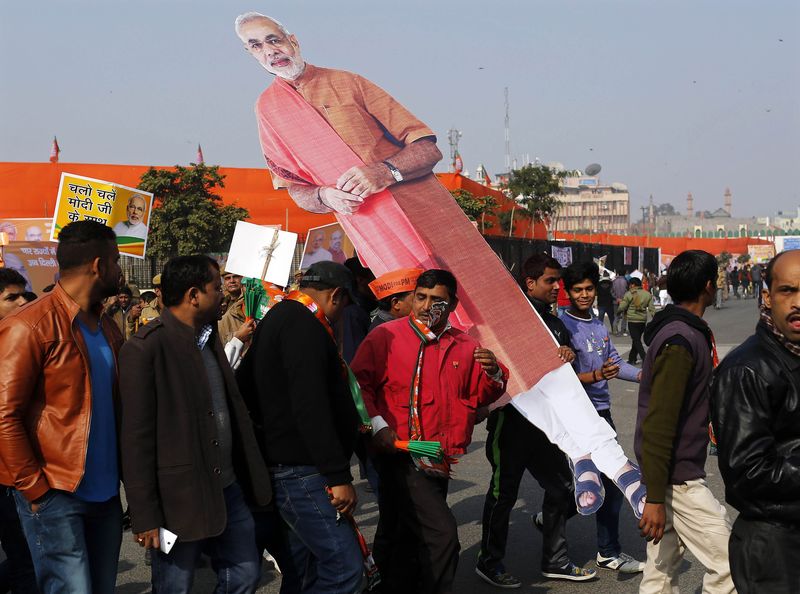By Rupam Jain Nair and Aman Shah
GANDHINAGAR, India (Reuters) - Global statesmen and business titans descended on Indian Prime Minister Narendra Modi's home state on Sunday to pay homage to the man they count on to unleash big-bang reforms and create one of the few bright spots in a troubled world economy.
Big business cheered Modi when he won India's strongest election mandate in 30 years last May, and he has caught its attention with eye-catching initiatives like a 'Make in India' campaign complete with lion logo.
Now, the 64-year-old leader has ramped up the Vibrant Gujarat jamboree he founded as the state's chief minister in 2003, turning it into a pitch to put his nation of 1.25 billion people, most of them poor, firmly on the investment map.
"India is marching forward with a clear vision to become a global power, even as most of the world is struggling with low growth," the country's richest man, Mukesh Ambani, told an audience of hundreds of chief executives and politicians.
U.S. Secretary of State John Kerry led a roll call of leaders, including U.N. Secretary General Ban Ki-moon and World Bank head Jim Yong Kim, converging on Modi's home town of Gandhinagar for the three-day Davos-style bash. President Barack Obama visits India later this month.
Yet, eight months into Modi's rule, the failure of Asia's third-biggest economy to emerge from its longest growth slowdown in a generation is raising questions about how much substance there is behind Modi's promise of "red carpet, not red tape".
His Make in India drive has drawn comparisons with the manufacturing miracle that turned China into the world's second-largest economy, outstripping India's fourfold since 1980.
Sceptics argue that India's competitive strengths are not in making and exporting things, but in areas like information technology and business process outsourcing where it is a world leader.
DELIVERING ON THE PROMISE
Vibrant Gujarat, held every two years, has yielded billions of dollars in investment promises but only a fraction of the deals announced has come to fruition.
In keeping with tradition, Ambani said his Reliance Industries (NS:RELI) conglomerate would invest a huge 1 trillion rupees ($16 billion) in its home state of Gujarat over the next year to 18 months. He gave no details, but Reliance has embarked on major expansion.
"There is an air of optimism in the air of India," said Sam Walsh, CEO of global mining giant Rio Tinto (AX:RIO), who flagged two potential projects: a $2 bln iron ore project in Odisha state and an investment in Madhya Pradesh that could employ 30,000 diamond cutters.
Modi needs investors to put their money where their mouths are to lift stagnant capital investment that has held back India's growth to 5.3 percent.
That is expected to accelerate this year to 6.4 percent, said the World Bank's Kim, who called India a "bright spot" in an otherwise gloomy global economic landscape.
That would still be short of the 7-8 percent India needs to create work for the one million people who join the workforce every month.
Modi has made headway on making it easier for outsiders to invest more in real estate, insurance and defence, but a rigid labour market and rotten infrastructure are huge deterrents.
India slipped to 142nd out of 189 in the World Bank's latest Doing Business Index. Modi wants India in the top 50.
"Investors want credibility, stability and at the same time flexibility. Right now, India is a bit of an inflexible market," said Kilbinder Dosanjh, a director for Asia at Eurasia Group, a geopolitical risk consultancy.

($1 = 62.3450 Indian rupees)